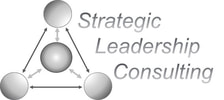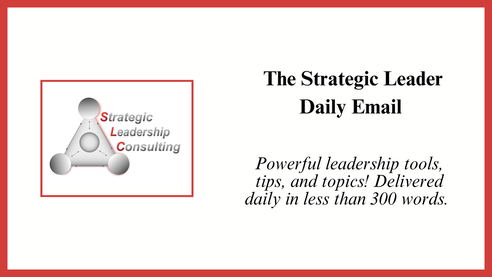|
Colleagues,
On Monday we looked at “my” busy day. Yesterday we looked at three epiphanies that pave the way for developing a strategic mindset:
Today, we will apply the second and third epiphanies to my busy day in order to understand what choices I made. The point of this is not to judge my decisions as being good or bad, but to better understand when and why I made them. The regular font is from Monday’s vignette and the blue italics are today’s commentary. I give a cursory nod and mumble good morning to my colleagues as they walk by my desk, most of them as intent on getting started as I was. I prioritized my needs to get things done and passed on the opportunity to build a sense of community in my workplace. Although I try and focus on my inbox, several different people come to me with questions over the course of the next 90 minutes. I decide to lower by efficiency with email in exchange for helping my colleagues and possibly learning some useful information. Despite the progress, I get bogged down in answering some resource availability questions from Didier, the lead manager for project Blue. I leave that email half completed… Why? Maybe because I’m afraid of giving half an answer, so I delay until I can give a “perfect” answer, perhaps knowing that I won’t really be able to address the issue satisfactorily? I leave the office briefly to grab lunch at the local fast food place and return to eat at my desk. I gobble down my meal as I review a report on the project Red status, which I need to submit next week. Again, I pass on the opportunity to build community by eating lunch with my colleagues. They also probably passed on that opportunity. I value the quality of work above my own health, at least in this case as I choose to get to the office early and eat unhealthily as opposed to spending extra time at home assembling a nutritious meal. After lunch I spend 90 minutes working on the presentation that I’ll use to summarize the project Red report. I check email again and respond to a few things. Why did I feel compelled to check email here? What was my priority? I manage to get Gregg and Akira’s issue resolved but arrive late to my afternoon meeting. I chose to finish resolving the issue and prioritized it over being punctual to the meeting. It’s mostly informational and I’m relieved that I didn’t miss anything important. I review the agenda as I sit down. None of it really applies to me and I spend the next 45 minutes trying to look interested while surreptitiously responding to texts and email on my phone. I chose to spend 45 minutes in a meeting that didn’t help me. Did I do that because I would make someone angry if I didn’t show up? Maybe I didn’t know it would be useless for me? Or is this a standing meeting that occurs weekly and is always a waste of time, meaning that I would rather comply than advocate for a more effective meting format? Or should the meeting have been meaningful, and I just didn’t pay close enough attention to see it? I doubt Nadia is going to make it through the first year. I add the complaint to my file and check the metrics on Nadia’s performance over the past two months. I spend 45 minutes crafting an email to Nadia inquiring about the situation and noting my disappointment in the metrics. I choose to document a situation and confront (via email) a colleague about her poor performance. I view documentation as both an ethical and policy priority. I sigh deeply and begin to add the other things I didn’t get done: Reach out to James, one of my new reports. I prioritize responding to urgent matters above investing time that will only yield dividends in the future and prioritize the urgency of my tasks above the mentoring or training needs of a new employee. Oh, did I ever finish the presentation? If I don’t have a system for clearly identifying priority tasks, do I value the adrenalin rushes that go along with being on the treadmill of the urgent above the long-term needs of my organization, or even myself? Or is it simply fear that drives me to respond and react instead of planning and executing? Of course, it’s not that simple. It isn’t just about our priorities because others have their own priorities. However, becoming aware of our choices allows us to take the first step off the treadmill by becoming intentional about how we invest our time. Tomorrow I’ll walk you through an examination of some of your own recent choices. Do good and be well, Frederick
0 Comments
Leave a Reply. |
Categories
All
Archives
July 2024
|


 RSS Feed
RSS Feed